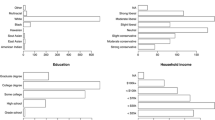Abstract
Zajonc (1980) argued that, contrary to what is commonly believed, an affective judgment about a stimulus may be independent of the cognitive processes through which we know what that stimulus is. The evidence Zajonc offered (the exposure effect in the absence of recognition) does not entail this claim. An example of the sort of experiment that could do so is offered. When carried out, however, this study indicated the opposite: An affective judgment about a stimulus depended on how it was cognitively interpreted. We argue that what is commonly believed in this area is presumptively correct: Affective judgments about a stimulus depend on whatever information is possessed about that stimulus.
Similar content being viewed by others
References
Baars, B. J. (1981). Cognitive versus inference.American Psychologist, 36 223–224.
Birnbaum, M. H. (1981). Thinking and feeling: A skeptical review.American Psychologist, 36 99–101.
Boring, E. G. (1930). A new ambiguous figure.American Journal of Psychology, 42 444–445.
Fehr, B., & Russell, J. A. (1984). Concept of emotion viewed from a prototype perspective.Journal of Experimental Psychology: General, 113 464–486.
Holyoak, K. J., & Gordon, P. C. (1984). Information processing and social cognition. In R. S. Wyer, Jr. & T. K. Srull (Eds.),Handbook of social cognition (Vol. 1). Hillsdale, New Jersey: Erlbaum.
Kunst-Wilson, W. R., & Zajonc, R. B. (1980). Affective discrimination of stimuli that cannot be recognized.Science, 207 557–558.
Lazarus, R. S. (1981). A cognitivist's reply to Zajonc on emotion and cognition.American Psychologist, 36 222–223.
Lazarus, R. S. (1984). On the primacy of cognition.American Psychologist, 39 124–129.
Leeper, R. W. (1935). A study of a neglected portion of the field of learning: The development of sensory organization.Journal of Genetic Psychology, 46 41–75.
Mandler, G. (1984).Mind and body. New York: Norton.
Mandler, G., & Shebo, B. J. (1982).The Kunst-Wilson and Zajonc experiment: Failures to replicate. Unpublished note, available from G. Mandler, Center for Human Information Processing, University of California, San Diego, La Jolla, California 92093.
Matlin, M. W. (1971). Response competition, recognition, and affect.Journal of Personality and Social Psychology, 19 295–300.
Mellers, B. (1981). Feeling more than thinking.American Psychologist, 36 802–803.
Moreland, R. L., & Zajonc, R. B. (1977). Is stimulus recognition a necessary condition for the occurrence of exposure effects?Journal of Personality and Social Psychology, 35 191–199.
Nelson, T. O. (1978). Detecting small amounts of information in memory: Savings for nonrecognized items.Journal of Experimental Psychology: Human Learning and Memory, 4 453–468.
Posner, M. I., & Keele, S. W. (1968). On the genesis of abstract ideas.Journal of Experimental Psychology, 77 353–363.
Russell, J. A., & Snodgrass, J. (in press). Emotion and the environment. In D. Stokols & I. Altman (Eds.),Handbook of environmental psychology. New York: Wiley.
Seamon, J. G., Brody, N., & Kauff, D. M. (1983). Affective discrimination of stimuli that are not recognized: Effects of shadowing, masking, and cerebral laterality.Journal of Experimental Psychology: Learning, Memory, and Cognition, 9 544–555.
Slife, B. D. (1981). The primacy of affective judgment from a teleological perspective.American Psychologist, 36 221–222.
Stang, D. J. (1974). Methodological factors in mere exposure research.Psychological Bulletin, 81 1014–1025.
Stang, D. J. (1975). Effects of “mere exposure” on learning and affect.Journal of Personality and Social Psychology, 31 7–12.
Tulving, E. (1974). Cue-dependent forgetting.American Scientist, 62 74–82.
Tulving, E., & Thomson, D. M. (1973). Encoding specificity and retrieval processes in episodic memory.Psychological Review, 80 352–373.
Watkins, M. J., & Tulving, E. (1975). Episodic memory: When recognition fails.Journal of Experimental Psychology: General, 104 5–29.
Whitfield, T. W. A., & Slatter, P. E. (1979). The effects of categorization and prototypicality on aesthetic choice in a furniture selection task.British Journal of Psychology, 70 65–76.
Wilson, W. R. (1979). Feeling more than we can know: Exposure effects without learning.Journal of Personality and Social Psychology, 37 811–821.
Zajonc, R. B. (1968). Attitudinal effects of mere exposure.Journal of Personality and Social Psychology, Monograph, 9(2, Part 2, 1–28).
Zajonc, R. B. (1980). Feeling and thinking: Preferences need no inferences.American Psychologist, 35 151–175.
Zajonc, R. B. (1984). On the primacy of affect.American Psychologist, 39 117–123.
Zajonc, R. B., Pietromonaco, P., & Bargh, J. (1982). Independence and interaction of affect and cognition. In M. S. Clark & S. T. Fiske (Eds.),Affect and cognition: The seventeenth annual Carnegie symposium on cognition. Hillsdale, New Jersey: Erlbaum.
Author information
Authors and Affiliations
Additional information
This study was supported by a grant from the Social Sciences and Humanities Research Council of Canada. We are grateful to Eric Eich, Dan Kahneman, Del Paulhus, Anne Treisman, Auke Tellegen, and Larry Ward for their advice on matters discussed in this article, and to Liz McCririck for her patient help in preparing the manuscript. We are particularly grateful to R. B. Zajonc for his comments on a previous draft of this article.
Rights and permissions
About this article
Cite this article
Russell, J.A., Woudzia, L. Affective judgments, common sense, and Zajonc's thesis of independence. Motiv Emot 10, 169–183 (1986). https://doi.org/10.1007/BF00992254
Issue Date:
DOI: https://doi.org/10.1007/BF00992254




